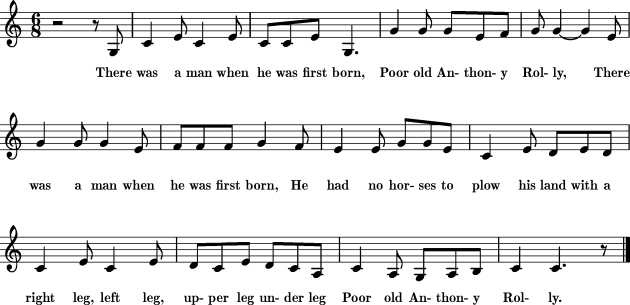Poor Old Anthony Rolly- Barhight (PA-NY) pre-1920 Recorded by Stekert, Songs of a New York Lumberjack 1958
POOR OLD ANTHONY ROLLY- From Mr. Ezra ("Fuzzy") Barhight, age eighty-one, of Cohocton, New York, who learned it in Pennsylvania. Sung by Ellen Stekert. New York, Folkways Records 1958.

There was a man, when he was first born,
Poor old Anthony Rolly
There was a man, when he was first born
He had no horse to plow his land
With a right leg, left leg, upper leg, under leg
Poor old Anthony Rolly.
So he hitched the pig with his old cow
And plowed the corn, the Devil knows how.
Well, the Devil he came to the old man's plow
"It's your oldest son I'm after now."
"You cannot have my oldest son
You'll have to take the old woman or none."
So the devil he took her all up on his back
And like and old fool he went carrying his pack.
Well he carried her over three fields more,
At length he came to his own trap door.
There sat little Devils all bound in chain,
She upped with her shovel and knocked out their brains.
Then one little Devil all in a red cap,
She upped with her shovel and gave him a slap.
Then three little Devils peeped over the wall
Crying, "Take her back, Daddy, she'll brain us all."
So the devil he took her all up on his back
And like and old fool he went carrying her back.
Well, he carried her over three fields more
At length he came to the old man's door.
Now that shows that the women are worse than the men
They'll go to Hell and come back again.
Liner Notes: The eighteen songs in this album are from the repertoire of one man, Mr. Ezra ("Fuzzy") Barhight, age eighty-one, of Cohocton, New York. He learned most of these songs in his younger years from his mother and from the lumbermen he worked with in his travels across Northern Pennsylvania and southern New York State. Of the nearly one hundred songs Fuzzy sang for me, there were only about ten that he could comment on as to where and when he had learned them and most of these he learned from his mother. But while his memory of how he learned his songs is vague, his feeling about them certainly is not. After I had pestered him awhile about the origin of a song, he leaned forward in his chair and said to me in a loud voice, "These are all real songs. These ain't none of your old humbug, hop-and-go-fetch-it dancing songs." He seldom listens to his radio and vows that he never learned a song from a book, just from people who sing. It was in 1920, he says, that he learned his last new song.
Fuzzy was born in Galalee, Wayne County, Pensylvania. His mother was born in the same town of German parents and his father, whom he never saw, was also American born. He traveled across northern Pennsylvania with his mother and step-father, Thomas Clark. They were always quite poor, his setp-father taking odd jobs, hauling lumber, logs and bark, and
then moving on. Fuzzy worked, as he says, ever since he was old enough to hold onto a line, and everywhere he went he sang and learned new songs. Most of his sentimental songs were learned from semiprofessional performers. Of one of these songs he says, "I learned that when I used to go over there to Sio and play second rhythm. They was always singing to these dances, you know. Old fashion days, the old fashion dances, they used to sing and dance. We had a helluva time." Most of his tall tales and lumbermen and sailor songs he learned "evenings, just singing evenings in the lobby of the camp (lumber camp). We used to get together, thirty, forty of us and sing songs till midnight." Of other songs he would say, "I learned that when I was on my mother's knee."
SIDE I, Band 6: POOR ANTHONY ROLLY (Child #278)
Francis James Child included this ballad in his great textual compilation under the title "The Farmer's Curst Wife." It is probable that in the earliest forms of the ballad, the farmer made a pact with the devil in order to secure help to plow his fields. In return, the devil was to receive the soul of some eember of the family at a later date. Modern forms of the ballad do not relate this incident, but merely have the devil calling on the farmer to claim some member of the family. In this varsion, the farmer instructs the devil to take his wife instead of his son; in most versions, the devil takes the wife by choice.
As long as the battle of the sexes continue, songs with motifs such as this will be sung. It is no surprise, then, that this ballad has had a long history and is one of the most widely collected ballads in the United States. As with most American versions, the ballad ends on a humorous philosophic note extolling one of womankind's most unique virtues. Of entertainine interest is the almost numberless varieties of refrains recorded with this ballad. In this respect, the version sung here is of special note, as the "Anthony Rolly" refrain, most often found appended to the nursery song "Frog Went A-Courting", has only been collected once previously as part of "The Farmer's Curst Wife."